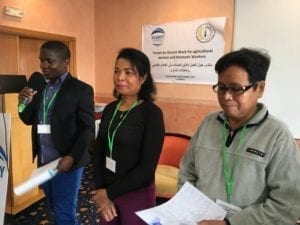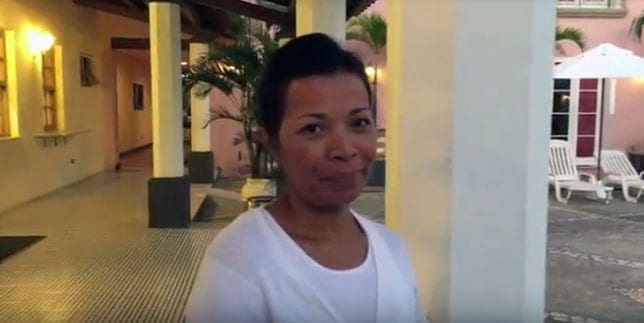Marie Constant has worked as a domestic worker in Lebanon since 1997. Originally from Madagascar, Constant has been fortunate to have a good employer. But most migrant domestic workers are not so lucky.
“In general, domestic workers [must] work from morning until evening with no specific break time and no holidays,” she says, speaking in French through a translator. “When we receive guests, we don’t have choice but to stay up late working until the guests leave, which is usually around midnight or sometimes around 1 a.m. Most domestic workers don’t have the right for the weekly leave.”
“And because of these rights abuse, we decided to form a union to defend our rights.”
(Constant discusses domestic workers and the struggle for rights on the job in this Workers Equality Forum video.)
‘We Are Advancing”

Marie Constant (center), joined other domestic worker rights advocates in Morocco last year for a Solidarity Center forum on decent work. Credit: Solidarity Center/Tula Connell
In 2015, she joined 300 domestic workers at the founding congress of the Domestic Workers Union in Lebanon, the first union of migrant domestic workers in the Arab region.
The union “is a source of great pride for us,” Constant says. Affiliated to the National Federation of Workers’ and Employees’ Unions in Lebanon (FENASOL), the union is yet to be officially recognized by Lebanon.
Much of Constant’s outreach involves informing domestic workers about the options for improving their wages and working conditions.
“We try to reach out to all the domestic workers women in most the regions in order to educate them about their rights.”
Despite the challenges, Constant recognizes domestic workers in Lebanon have taken big steps toward achieving dignity and decency on the job to which they and all workers are entitled, and she is optimistic about the future.
“We have a lot of hope. Even if we know we have a long way to go and that there are a lot of hurdles along the way, we are advancing, not regressing.”

